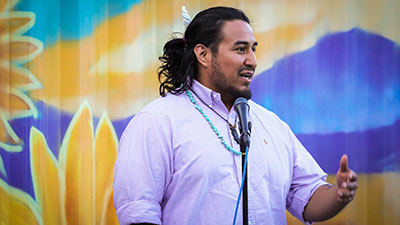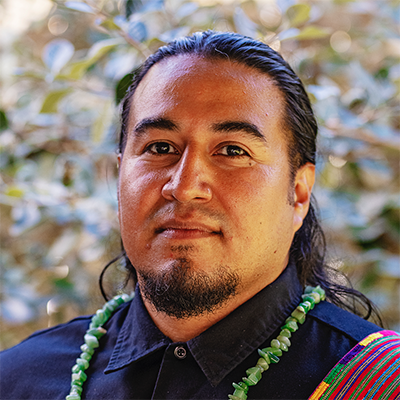Daniel Hernandez / Arcia Tecun: Fall 2023 Community Practioner-in-Residence
 We are so fortunate to host Daniel Hernandez, pen name Arcia Tecun after his grandmothers,
as the Fall 2023 Community Practitioner in Residence in Environmental Humanities.
Supported by the Mellon Foundation, the Community Practitioner-in-Residence program
is a semester-long residency for community leaders looking to use the tools of humanities
and culture to further environmental and climate justice.
We are so fortunate to host Daniel Hernandez, pen name Arcia Tecun after his grandmothers,
as the Fall 2023 Community Practitioner in Residence in Environmental Humanities.
Supported by the Mellon Foundation, the Community Practitioner-in-Residence program
is a semester-long residency for community leaders looking to use the tools of humanities
and culture to further environmental and climate justice.
Daniel is Wīnak (Urban Diasporic Highland Maya), descends from many peoples, and has local
ties to the Rose Park community in Soonkahni (Salt Lake Valley) and Tāmaki Makaurau
(Auckland) in Aotearoa (New Zealand). He is currently the Director of Culture for Tracy Aviary and the Nature Center at Pia Okwai (Jordan River Nature
Center), where he is currently working on local-global Indigenous Eco and Food Justice
projects alongside place-based pedagogy research with diverse communities. Below are Daniel's written answers to a few interview questions.
What brought you to ecojustice work and your position with the Tracy Aviary's Jordan River Nature Center?
In the process of some life circumstances that had my partner and I looking to move back here, my friend Kēhau Vaughn shared that the Tracy Aviary was building a Nature Center on the west side and had some work opportunities. I hadn’t really been looking for something outside of academia at that time, but my work had always been community-based, and this was exciting news. Ultimately the timing of when we needed to get back here worked out with this opportunity. The Nature Center project was of interest because of the target audiences and potential projects. I was keen to have a say and an influence on this already mostly designed and underway project as someone from a west side working-class community with local networks, who as a critical Indigenous scholar could also speak to social issues such as race, gender, class, and Indigeneity. In the process I was offered a position as the inaugural director of culture, which is still being defined, but has included consulting, outreach and relationship building, program development, policy writing, and research, among other things. My vision for the position is for it to catalyse and assist in facilitating a transformative paradigm shift in conservation practice and thought with a critical and community-based eco-justice lens and approach. The possibilities here are quite special and so important, but are also up against a legacy and system of oppression that needs to be continually confronted, dismantled, and re-imagined.
In what ways do you see yourself and your work connected to environmental humanities?
As long as I can remember I have been interested in food, cooking and eating it, and thinking about meaning, story, relationships, and lessons. This ongoing interest has transformed a bit within my scholarly work into a broad trans-disciplinary range of study that has orbited heavily around Indigenous ritual food. Food justice and Indigenous ecological knowledge in food customs was my entry to the realm of eco and climate justice. Additionally, my interests and experience with global Indigeneities has fuelled my critical consciousness of place and mobility. As someone who sits in between many relations and positionalities, belonging to many worlds, and likewise embracing a past future mobility in the present, the issues of people and place are regularly on my mind. My work, ideas, and practice have not always been as explicitly linked to the cross-section of socio-ecological issues, but perhaps it was always heading there. I see myself and my work very much invested in the social and cultural. I am now interested in re-visiting the intersection of where people are entangled with the constructs and dichotomies of ‘nature-wilderness and modernity-civilization’. I am interested in global Indigenous philosophies and practices and how they simultaneously relate with, merge into, and rub against shifting contexts of time and space. In other words, reflecting on and forming a fiercely place-based sensibility that is deeply globally connected, broadly relationally mindful, radically opposed to oppressive structures of modern power, and creative enough to imagine more dignified and equitable worlds into being.
On October 17th at 7pm you'll be sharing a screening of your documentary at an event called 'Stories of Place with Arcia Tecun.' Tell us more about what audiences can expect from this event.
This film project features four incredible and unique community voices with profound insights on place, conservation, and in particular with Pia Okwai (Jordan River). Conservation and environmental work like many fields remains dominated by a narrow demographic of people. This film takes an eco-justice and community based approach, which highlights local connections with diverse perspectives and peoples. This includes a range of different experiences to shared space that offers an opportunity to relate in a more intimate and healthy way now. Featured in this film are Secadio ‘Son’ Sanchez, Frances Ngo, Dr. Tēvita Ka‘ili, and Viviana Hernandez. These brilliant people offer a new lead to discussions of place-based relationships and conservation actions with their thoughtful observations and reflections and generous telling of some of their story.
Finally, what advice or guidance do you have for students seeking to do good community
engagement work? 
I would advise to first ground yourself in your roots. Who are you? Where do you come or descend from? Where are you a local? Who are your people(s)? What experiences can you speak to most personally? Who is the work for? Why are you doing it? These questions can be interpreted broadly, but my encouragement is to position yourself and reflect on what has and continues to shape your worldview and cultural practice. This invitation is also to consider responsibilities and where you can have the greatest impact. Which community or communities are you based in as a participating member? I believe meaningful community-based and community-led work is more sustainable and impactful, which is why I make these suggestions. We can also relate with and work with peoples outside of our own communities, but in my view and practice we should be grounded in our own positions and communities first in order to do so in an equitable way.
Categories
Featured Posts
Tag Cloud
- community engagement (12)
- outdoor recreation (2)
- outreach (1)
- alumni (3)
- admissions (1)
- faculty (8)
- practitioner-in-residence (2)
- cultural anthropology (1)
- utah award in the environmental humanities (1)
- environmental justice (2)
- STEMCAP (2)
- STEM (2)
- water (1)
- communications (2)
- humanities (1)
- Taft-Nicholson Center (1)
- director (3)
- student (5)
- API (1)
- Asian American (1)
- Pacific Islander (1)
- graduation (1)
- research (3)
- thesis (1)
- project (1)
- Indigenous (1)
- Shoshone (1)
- Great Salt Lake (2)
- Bear River (1)
- land acknowledgement (1)
- STEMAP (1)
- public engagement (1)
- science (1)
- science communication (1)
- Wilkes Center (1)
- climate change (1)
- climate science (1)
- climate policy (1)
- policymaking (1)
- funding (1)
- storytelling (1)
- radio (1)
- journalism (1)
- racial justice (1)
- outdoor education (1)
- writing (1)
- non-fiction (1)
- energy extraction (1)
- reading (1)
- environmental education (1)
- affect theory (1)
- media (1)
- rhetoric (1)
